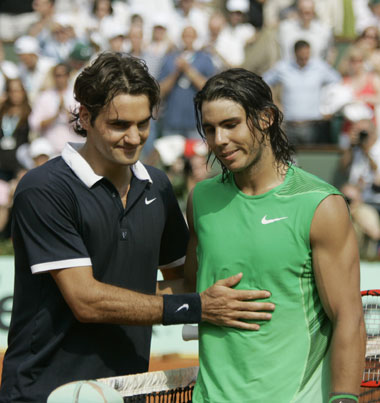
Spain's Rafael Nadal (right) receives a pat from vanquished Switzerland's Roger Federer at the end of the French Open final in Paris on Sunday.
NO less a tennis authority than Bjorn Borg wonders whether Roger Federer can stave off Rafael Nadal at Wimbledon.
Borg is tied with Federer for the post-1900 record with five consecutive titles at the All England Club from 1976-80, and Federer aims to claim No. 6 in a row a month from now.
And, granted, Borg wasn't exactly on the mark when he predicted a tight French Open final: No. 2-ranked Nadal beat No. 1 Federer 6-1, 6-3, 6-0.
Still, 11-time major champion Borg's words carry weight, and after watching Sunday's final at Roland Garros from a front-row seat, the Swede said of Nadal: "If he survive the first couple of rounds this year, I pick him to win Wimbledon."
Over Federer?
"Yes," Borg said.
After losing the most lopsided grand slam men's final since John McEnroe allowed Jimmy Connors to take only four games at Wimbledon in 1984, Federer spoke on Sunday about wishing he could face Nadal on grass more often.
There are far more tournaments played on clay than on grass, and there's a strong possibility the rivals will meet on the slicker surface only once in 2008, just as they met once at the All England Club in 2006 and 2007 - in the Wimbledon final.
Truth be told, if Federer's lucky, he won't have to play Nadal at all on grass. At this point, perhaps Federer ought to hope that somebody else eliminates the 22-year-old Spaniard before yet another meeting.
Because here is the surprising thing: Nadal has come much closer to beating Federer at Wimbledon than Federer has come to beating Nadal at the French Open.
Never at Roland Garros has Federer really put a scare into Nadal, the first man since Borg in 1978-81 to win four consecutive French Opens.
In 2005, they met in the semifinals. In 2006, 2007 and 2008, they met in the final. Each of the first three matchups, Federer pushed Nadal to four sets. But the 26-year-old Swiss star didn't even come close to making a single set competitive on Sunday.
At Wimbledon, in contrast, they played four sets for the 2006 championship, followed by a 7-6 (7), 4-6, 7-6 (3), 2-6, 6-2 "thriller," as Federer deemed it, in the 2007 final.
Federer is supposed to be the one of the pair with the adaptable skills and all-court game, yet it's Nadal who has changed the way he plays even more. He'll serve-and-volley at the All England Club, and on Sunday at Roland Garros, the left-hander was standing right along the baseline, playing an attacking brand of tennis not generally associated with clay-court greats.
"I am young. I have to continue to improve," Nadal said. "I think I'm improving, and that's important. I have to continue to improve if I want to be No. 1, No. 2, No. 3, because a lot of good players are there."
And here's the other thing: He might be fresher than Federer heading into the quick turnaround between the French Open and Wimbledon.
Generally, with its longer points and tough footwork, the clay-court grand slam is thought to be the most grueling of the bunch. Yet Nadal hardly appeared to be sapped of any energy at the end, perhaps because he spent so little time on court.
He is the first man to earn the trophy at Roland Garros without dropping a set since Borg did it in 1980.
"It's important I don't have a lot of problems, a lot of long matches," Nadal said, "because, especially mentally, it's more difficult to go to the next places and be at 100 percent, no?"
It will be instructive to see how Federer moves forward after his worst loss in 173 career grand slam matches, and his first 6-0 set anywhere since 1999, back before he had cracked the top 50 in the rankings.
Could his confidence be shaken by Sunday's rout? He insists not.
"I'm going to look forward to grass," he said. "I think the second half of the season, hopefully, is going to be better than the first."
Nadal was asked on Sunday whether the way things went during the French Open final made him feel like the best player in the world at the moment. "No, no, no," Nadal said. "I feel like No. 2, because I am. I am No. 2, and closer to the No. 3 than the No. 1."
That last part is true. Had Nadal lost to third-ranked Novak Djokovic in the semifinals in Paris, those two men would have swapped spots in the rankings.
Now, what Nadal knows he needs to do is win a grand slam title somewhere other than Paris. Borg thinks it could happen soon.
"The way he played last year (at Wimbledon), it was an unbelievable final. He was very unfortunate not to win that particular match. He had chances," Borg said. "And I'm sure after losing a match like that he wants to come back and try to win that championship."
(Agencies via Shanghai Daily June 11, 2008)